OPENING CEREMONY AT THE 2008 OLYMPICS IN BEIJING

Beijing and the Chinese government pulled out all the stops for the Opening Ceremonies, which was arguably the most impressive display of any kind the world has ever seen within and outside the world of sport, exceeding anything staged at previous Olympics, at Superbowls, Broadway, the West End, Woodstock or ancient Rome.
Before a live audience of 91,000 in the Bird’s Nest stadium and a television audience of 4 billion, the Chinese put on a show that featured 2008 drummers, all drumming in unison with glowing red drumsticks, and all dressed in silver robes trimmed with crimson; synchronized card displays for which one practice lasted 48 straight hours; mind-blowing fireworks that reverberated along the 16-kilometer-long central axis of Beijing, with the most dramatic display sprouting forth from 287 fireworks points on the stadium.
The Opening Ceremonies lasted for four hours and reportedly cost more than $100 million, more than a Hollywood blockbuster. More than 14,000 performers, wearing 15,153 costumes took part. More than 30,000 fireworks were set off and 40 tons of wire was used to suspend performers and objects. Some 840 million Chinese watched it on television. Among the world leader on hand to see it live were U.S. President George Bush, Russian Prime Minister Vladimir Putin, and French President Nikolas Sarkozy.
The theme of the Opening Ceremonies was China’s history and achievements. A 400-foot-long Chinese scroll — actually one of the biggest LED television screens ever made — was laid on the stadium floor to celebrate Chinese inventions such as gunpowder, paper, movable type and the compass; honor Chinese cultural advances such as martial arts and traditional music; highlight periods of China’s history; and provide an electronic stage for the masses of dancers and performers.
Yao Ming, accompanied by nine-year-old Lin Hao, a boy who rescued two schoolmates from the rubble of the Sichuan earthquake, was the flagbearer for China. When he emerged three hours after the Opening Ceremonies kicked off there was a huge ovation: volunteers left their posts to catch a glimpse and Chinese who watched it on television wept. Lope Lomong, an American runner from Darfur in Sudan, carried in the American flag. Loud cheers from the Chinese in attendance went up for Hong Kong, Chinese Taipei (Taiwan), allies Pakistan and North Korea, the soccer nations Brazil and Spain, and Iraq. There were no discernable boos for rivals and sometime enemies like the United States or Japan, targets of nationalists outrage in the past. Each spectator was give a lightweight fabric sack.
See Articles Under OLYMPICS factsanddetails.com ; Beijing Olympics site en.beijing2008.cn ; Olympic.org olympic.org ; China.org on the 2008 Games china.org.cn ; Chinese Olympic Committee en.olympic.cn ; China’s Olympic History china.org.cn ; Book: “Olympic Dreams: China and Sports, 1895-2008" by Xu Gouqi
Reactions to the 2008 Olympic Opening Ceremonies
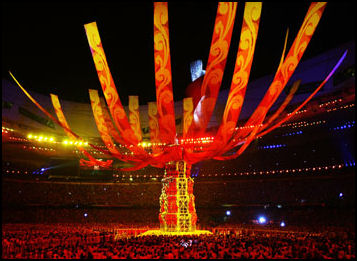
New York Times photographer Doug Mill wrote: “I was in awe. I frequently turned around to look at the audience to see what their reaction was, and I was amazed to see what their reaction was, and I was amazed to see how intent they were. Everybody was so focused on the athletes, everybody had their cameras. There were thousands of flash bulbs going off, and they were really recording history like we were. It was just a beautiful scene.”
Washington Post television critic Tom Shales wrote, “Eye-poppers gave way to jaw-droppers, stunners were followed by dazzlers” it “added up to be the most visually beautiful evenings of television ever seen...The combination of wizardly technical effects and sheer numbers of participating performers made the festivities...an awe-inspiring wonder, a gift from China to the world...The combination of centuries-old art forms and state-of-the-art electronics, plus enough fireworks for a hundred Forths of July seemed appropriate for a nation straddling ancient tradition and neo-western economic revolution.”
Scenes from the Opening Ceremonies at the 2008 Olympics in Beijing
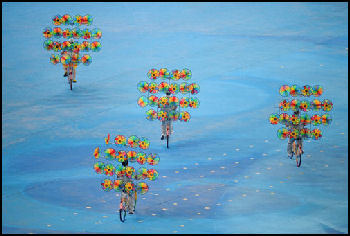
Shales wrote: “During the most amazing part of the show...a giant globe rose from the center of the stadium with dancers, clinging to it, secured by wires, while fireworks blazed into the night sky. On the upper stadium rim, Saturn flew by at one point, and whales swam above the spinning globe below,...Two singers performed at the very top of the Globe — the North Pole, as it were — and the the stadium floor was covered with a sea of children’s faces imprinted on giant cards. Beautiful, beautiful, beautiful.”
The Olympic flame was lit by Li Ning, six-time gold medalist and sporting good company owner, who was hoisted into the air on hidden cables and transported around the circumference of the Bird Nest stadium. Lang Lang and five-year-old Li Muzi played a piano duet. The score was written by Academy-Award-winning composer Tan Dun.
Everything about the Opening Ceremonies was supposed or be secret. Everyone involved signed confidentiality statements, promising not to reveal anything about the show. However a South Korean television crew was able to infiltrate one of the rehearsal and showed footage it took on South Korean television from where it found its way to Korean and Chinese websites and YouTube.
Opening Ceremony Controversies at the 2008 Olympics in Beijing
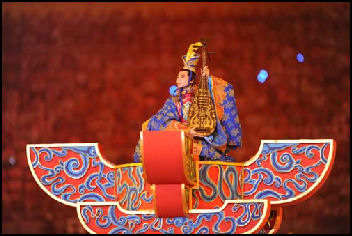
Lin Miaoke, the 9-year-old girl that “sang” the Chinese anthem “Ode to the Motherland”, during the Opening Ceremonies was lip-syncing the beautiful singing voice of a 9-year-old girl named Yang Peiyi because Peiyi was deemed not cute enough to perform the song herself. Her most egregious offense, apparently, was having crooked teeth.
Chen Qigang, music designer of the Opening Ceremony, said, “After several tests, we decided to put Lin Miaoke in the live picture while using Yang Peiyi’s voice, The reasons for this was we must put our country’s interests first. The girl appearing on the picture should be flawless in terms of her facial expressions and the great feeling she can give the people.”
He said the decision to replace Yang was made for nationalist reasons — namely portraying China in the most positive light possible — at the last minute due to a request from a Politburo member. Audience were not aware of the lip-syncing. Lin reportedly sang her heart in the show not knowing that Yang’s voice was the one that the audience was listening to. Later, Yang reportedly became depressed, according to her teacher, after seeing a tape of the Opening Ceremonies on television with Lin “singing” and bit herself on the arm.
Andrew Nathan of Columbia was a surprised why people were shocked that such a decision was made, He told Gail Collins in the New York Times, “This particular technique seems so standard. I’m a little puzzled about why everybody’s stuck on this example. I really don’t known how a little girls in China might respond to being told your teeth are not good enough. But doesn’t that happen all the time in Hollywood.”
Some of the fireworks shots shown on television of the Opening Ceremonies were prerecorded, faked and digitally enhanced to make them look better. The ariel footage of the giant footsteps created in the sky was a computer-generated image that took a year to make. Reasons for the charade include security concerns over a real ariel view being shot from a helicopter and worries that weather or smog might diminish the fireworks. On this Beijing Games Executive Vice President Wang Wei said, “Some of the footage had been produced before the Opening Ceremony to provide theatrical effect.” Some fireworks “were genuinely produced. Some maybe were used from previously recorded material.”
The children dressed up in ethnic costumes, representing China’s 56 ethnic groups, were Han Chinese not members of the ethnic groups they represented, The children, who carried the Chinese flag and handed it off to goose-steeping soldiers who then hoisted it up on the official Olympics flagpole, were members of the Galaxy Children’s Art Troupe, which the Asian Wall Street Journal reported was made up of young actors and actress primarily from the Han majority. On this matter Wang said, “It is typical for Chinese performers to wear different apparel from different ethnic groups. They wear different apparel to signify people are happy and friendly together.”
Preparations for the Opening Ceremony
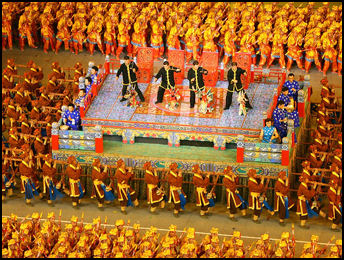
Chinese filmmaker Zhang Yimou was chosen to direct the Opening and Closing Ceremonies at the Beijing Olympics Stephen Spielberg was named as one of the consultants but later withdrew over the Darfur issue. Zhang Yimou has experimented with ideas, props and lighting at a show called Impressions staged at a water park in Hainan Island.
A year before the Olympics a big party was thrown in Tiananmen Square to inaugurate the final countdown for the Olympics. It featured the new pop song called "We Are Ready."
In the summer of 2007, somewhat of a big deal was made about a 44-pound, 8-year-old girl, Zhang Huimin, who ran 2,212 miles from Hainan Island in southern China to Beijing in 55 days — which roughly works out to 40 miles or about 1½ marathons a day — to bring attention to the determination of young athletes in the countdown to the Olympics. Zhang was followed on a moped by her father, who some said forced the child to perform the feat. When asked by reporters Zhang said running made her happy. Her father said she ran two miles a day since she was two and 15 miles a day since she was seven.
Zhang Yimou and the Opening Ceremonies at the 2008 Olympics in Beijing
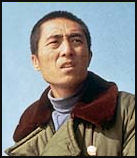
Zhang Yimou Film director Zhang Yimou was selected to do the Opening Ceremonies in part based on what he achieved in staging outdoor performances that combined theater and tourist spectacle. He spent more than two years designing and rehearsing the show. The final rehearsals were held over several months in a secure Olympics compound.
Zhang said in an interview that the Olympics presented a once in lifetime opportunity that only a fool would pass up. “For a century, this is the most important time for the Chinese people to honor guests from all over the world. I took his job, to a great extent, because I wanted to do something for the Chinese people.”
After the event was staged Zhang Yimou said that he was pleased with the Opening Ceremonies show but said there were serious problems in the rehearsals. “I regret many things, many details of this performance, may things I cold have done better,” he told the Chinese media. “For example, there are performers who were injured. I blame myself for that . It might have well have been avoided if I had given more detailed instructions.”
Injured Dancer and the Opening Ceremony
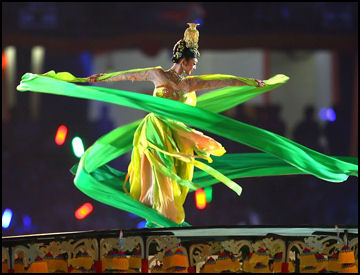
During rehearsals 12 days before the Opening Ceremonies Liu Yan, a talented 26-year-old dancer, fell from a three-meter-high platform on her head and back and was paralyzed. Regarded as one of China’s most talented classical Chinese dancers, Liu was preparing for the only solo piece during the Opening Ceremonies. During the rehearsals she leaped towards a moving platform that suddenly malfunctioned and plunged into a shaft, onto a set of steel bars, injuring her spine, members of her family told the New York Times.
Liu was taken to a hospital and underwent six hours of surgery. Her head was not injured badly. At the time of the Olympics she could move her arms, but had no feeling below her chest and could not move her lower body, including her legs. Games organizer asked friends and witnesses not to disclose the tragedy to the media, but recognized the tragedy three days after the Opening Ceremonies in response to chatter and rumors about the matter on the Internet.
Zhang Yimou visited Liu at the hospital. He said later, “I feel sorry for Liu Yan. My heart is full of regrets. I’m deeply sorry. Liu Yan is a heroine. She sacrificed a lot for the Olympics, for me, for the Opening Ceremony.”
Stars at the 2008 Olympics
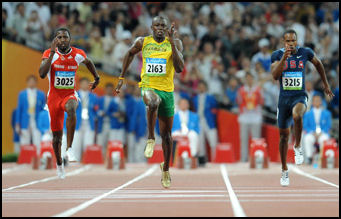
Usain BoltThe most popular American athletes in Beijing were not the swimmers Michael Phelps and Dana Torres but American basketball players like Kobe Bryant and LeBron James. They drew huge crowds whenever they were spotted.
Deron Williams, a reserve guard on the U.S. team, said, “I think we’re more known here than we are in the States, as far as fans go. The fans have been wonderful here. Everywhere we go they know all our names.” Tall African-American reporters mistaken for NBA players were also asked for their autographs.
Katerina Emmons of the Czech Republic won the first gold medal in the 2008 Olympics, in the 10-meter air rifle.
Usain Bolt was arguably the biggest star of the Beijing Olympics. He won the gold in the men’s 100 meter sprint in electrifying fashion, breaking the world record in the event with a time of 9.69 despite thumping his chest and unfurling his arms 20 meters before the finish. In the 200 meters he won gold and set a world record again, breaking American Michael Johnson’s once-thought-to-be untouchable time of 19.30 by .02 seconds, this time running through the finish and finished the Olympics with three golds and three world records when the Jamaican team, on which he ran the third leg, won the 4-x-1000 meter relay, with a time of 37.10, .30 seconds better than the previous mark by American runners who held on to the baton in 1993.
Other stars included Dana Tores, who at the age of 41 won a silver medal in the women’s 50-meter freestyle, just missing gold by 0.01 second; a South African swimmer, who placed sixth in the grueling 10 kilometer open water swim despite having only half a left leg; the Swedish wrestler who was banned from his sport for two years after throwing down his bronze medal in disgust, claiming he was cheated out of the gold; the Cuban tae kwon athlete who kicked a referee in the face; and the Tajik boxer who bit his opponent on the shoulder.
Star American athletes such as tennis player Serena Williams and basketball player Kobe Bryant often seemed busier off the court investigating marketing possibilities offered by China than they were on court. They granted interview to the Chinese media, chatted online with Chinese sports fans and held strategy session with their agents on the best way to exploit China. One of the key marketing principals in China, it seems, is gaining a fan base and then seeking sponsors interested in exploiting those fans.
Michael Phelps
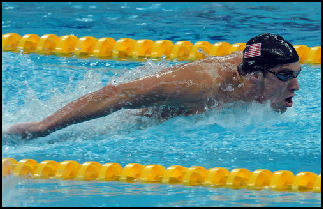
The biggest star of the Olympics arguably was Michael Phelps. As everyone knows he won gold medals in eight events: the 100-meter and 200-meter butterfly, the 200-meter and 400-meter individual medleys (IMs), the 200-meter freestyle and three relays. With all the preliminaries and semifinals added in he swam 17 races. One of his biggest challenges was being properly rested up for each race. In one case he had to swim butterfly semifinal less than 30 minutes after he set a world record in the 200 IM and in that 30 minutes was interviewed by the media and did his cool down and warmup routine.
The most memorable of his races were the 200 butterfly which he swam with water-filled goggles and the 100 meter butterfly which he won by .01 of a second by just out touching his rival — California-born, Serbian Milorad Cavic — who looked like he clearly had Phelps beat at the end. Phelps also got a little help from his friends. The American 4-x-100 freestyle relay team, which Phelps was a member, won by .08 seoncd with a dramatic come-from-behind leg by the anchor Jason Lezak who came from a half a body length back with 25 meters to go to beat the world record holder in the event.
It has been said that Phelps’s body — with its 6 foot 7 inch wingspan, mit-size hands, size 14 feet, unusually flexible joints, long torso and relatively short legs — is perfectly designed for swimming. His body produces much less lactic acid than other athletes, which gives endurance, power and amazing recovery ability that allows him to overcome the competition in the finals and recover in minutes for the next event.
Among the things were learned about Michael Phelps, who was 23 when he won all those golds, was that he eats over 8,000 calories a day, he is very close to his mother Debbie, and he loves hip-hop, especially Lil Wayne. He was given a $1 million bonus from Speedo for winning eight gold medals, he has been preparing for winning eight gold medals with his coach Bob Bowman since he was 11; and he is not as adept on land as he is in the water, once breaking arm while getting into a friends car.
Phelps was not widely embraced by the Chinese. There were empty seats in the Water Cube during his races; media coverage of his achievements was limited. His world record performance were relegated to pages 30 and 31 in Chinese sports dailies and people on the streets said they had never heard of him. Bloggers who wrote about his achievements were attacked by ultranationalists for not being patriotic.
In Mandarin Phelps’ name is “Fei-er-pu-si.” Some called him “fei yu,” or “flying fish.” When asked if he knew of Phelps, a food vendor told the Washington Post, “Oh yeah, I know the face. But the name is hard to remember. To me he looks like a big strong horse.”
Closing Ceremonies at the 2008 Olympics ins Beijing
The Olympics in Beijing formally came to an end with the Closing Ceremonies in the Bird’s Nest stadium,. Although not as spectacular as the Opening Ceremonies, the Closing Ceremonies show was still grand and fun nonetheless. Torrents of fireworks were set off; 6,800 performers, including dancers and acrobats, pranced around the field; and athletes freely roamed around mingling and partying.
Amy Shipley wrote in the Washington Post, “To a crescendo of cheers, China’s athletes streamed past dancing, scarf-waving cheerleaders...the order and pomp of the Opening Ceremonies 16 nights ago was replaced by casualness and frivolity and fun. Drums rumbled and spectators wildly waved red-and-orange fringed fans as the Summer Games wound to a close with the Closing Ceremonies that felt very much like a gigantic party.”
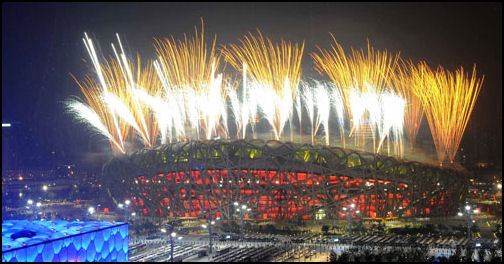
IOC President Jacques Rogge told the crowd, “Through these games, the world learned more about China and China learned more about the world...These were truly exceptional games.”
During the show Placio Domingo sang with Sing Zuying, a singer popular with the Chinese elite; drummers flew threw the air; and acrobats bounced in on pogo-sticks legs. To get people in the mood for the Olympics in London in 2012, a red double decker bus parked on the fields and turned into a stage with led Zeppelin guitarist Jimmy Page and British singing sensation Leona Lewis doing a version of Led Zeppelin’s “Whole Lotta Love”. Soccer icon David Beckham then kicked a ball into th crowd. Michael Phelps was interviewed in London and promised he would be back in 2012.
Image Sources:
Text Sources: New York Times, Washington Post, Los Angeles Times, Times of London, National Geographic, The New Yorker, Time, Newsweek, Reuters, AP, Lonely Planet Guides, Compton’s Encyclopedia and various books and other publications.
Last updated April 2010
